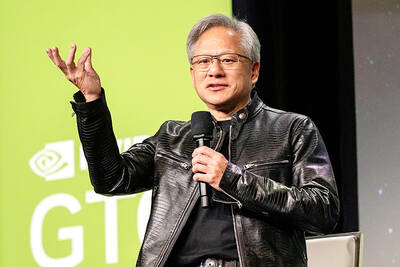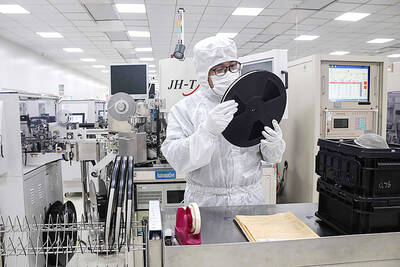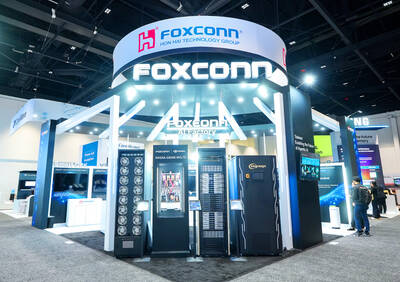Microsoft Corp is bringing its Bing search engine to OpenAI Inc’s ChatGPT, further tightening ties with the artificial intelligence (AI) start-up in a bid to challenge Google.
Bing would be part of the premium ChatGPT Plus service starting yesterday, Microsoft said, and the search engine would come to the regular version of the chatbot soon.
Using Bing lets customers get up-to-the-minute information, whereas ChatGPT has been trained only on data through Sept. 20, 2021.

Photo: AP
Microsoft is OpenAI’s biggest investor and a key partner, giving it an edge in the race to weave artificial intelligence into more software products. The start-up, whose chatbot became a viral hit in the past year, has helped Microsoft attract customers to a cloud-based service that lets its Azure clients use OpenAI products.
Azure OpenAI has 4,500 customers, including Volvo AB, IKEA, Mercedes-Benz Group AG and Shell PLC. That is up from 2,500 customers at the end of last quarter.
Microsoft unveiled the Bing ChatGPT update yesterday at a developer conference in Seattle. Earlier this month, OpenAI started adding Web browsing as an optional capability to its paid Plus tier. That relied partly on Bing, although the arrangement was not disclosed at the time.
Microsoft chief executive officer Satya Nadella has been refocusing Microsoft’s products around AI programs called copilots — assistants that help users perform tasks in Bing and Office, as well as security and finance software, based on OpenAI’s GPT-4 technology.
The software maker is trying to boost sales, attract more cloud-computing business and better compete with Google in search. So far, the OpenAI partnership has helped Microsoft position itself at the forefront of a rapidly churning market for new types of AI tools.
With the proliferation of AI-generated information, Microsoft said it would watermark such content so people know it is not human-made.
The company also said it would make those same tools available to developers to use.
“We’re giving you a bunch of amazing media provenance tools that will help users understand when they are seeing generated content or not,” Microsoft chief technology officer Kevin Scott told attendees at the conference.
Scott did not elaborate on the technological underpinnings of these tools, except to say that they are “cryptographic” watermarks.
Microsoft is also letting outside software developers and companies write programs that tie into its OpenAI-based artificial intelligence software.
As part of that push, Instacart Inc, Redfin Corp, Zillow Group Inc and Kayak Software Corp would work with Bing’s AI, Microsoft said.
Meanwhile, Adobe Inc and Atlassian Corp would release features for Microsoft’s corporate AI software that can be used with the Office suite.
To let other companies write features and programs that make use of these AI products, OpenAI is allowing them to develop so-called plugins to work with ChatGPT.
Microsoft yesterday said that it would use a similar model. Companies and programmers can use the same plugins across ChatGPT and Microsoft’s own consumer and corporate AI software.

It was late morning and steam was rising from water tanks atop the colorful, but opaque-windowed, “soapland” sex parlors in a historic Tokyo red-light district. Walking through the narrow streets, camera in hand, was Beniko — a former sex worker who is trying to capture the spirit of the area once known as Yoshiwara through photography. “People often talk about this neighborhood having a ‘bad history,’” said Beniko, who goes by her nickname. “But the truth is that through the years people have lived here, made a life here, sometimes struggled to survive. I want to share that reality.” In its mid-17th to

‘MAKE OR BREAK’: Nvidia shares remain down more than 9 percent, but investors are hoping CEO Jensen Huang’s speech can stave off fears that the sales boom is peaking Shares in Nvidia Corp’s Taiwanese suppliers mostly closed higher yesterday on hopes that the US artificial intelligence (AI) chip designer would showcase next-generation technologies at its annual AI conference slated to open later in the day. The GPU Technology Conference (GTC) in California is to feature developers, engineers, researchers, inventors and information technology professionals, and would focus on AI, computer graphics, data science, machine learning and autonomous machines. The event comes at a make-or-break moment for the firm, as it heads into the next few quarters, with Nvidia CEO Jensen Huang’s (黃仁勳) keynote speech today seen as having the ability to

The battle for artificial intelligence supremacy hinges on microchips, but the semiconductor sector that produces them has a dirty secret: It is a major source of chemicals linked to cancer and other health problems. Global chip sales surged more than 19 percent to about US$628 billion last year, according to the Semiconductor Industry Association, which forecasts double-digit growth again this year. That is adding urgency to reducing the effects of “forever chemicals” — which are also used to make firefighting foam, nonstick pans, raincoats and other everyday items — as are regulators in the US and Europe who are beginning to

NEXT GENERATION: The company also showcased automated machines, including a nursing robot called Nurabot, which is to enter service at a Taichung hospital this year Hon Hai Precision Industry Co (鴻海精密) expects server revenue to exceed its iPhone revenue within two years, with the possibility of achieving this goal as early as this year, chairman Young Liu (劉揚偉) said on Tuesday at Nvidia Corp’s annual technology conference in San Jose, California. AI would be the primary focus this year for the company, also known as Foxconn Technology Group (富士康科技集團), as rapidly advancing AI applications are driving up demand for AI servers, Liu said. The production and shipment of Nvidia’s GB200 chips and the anticipated launch of GB300 chips in the second half of the year would propel